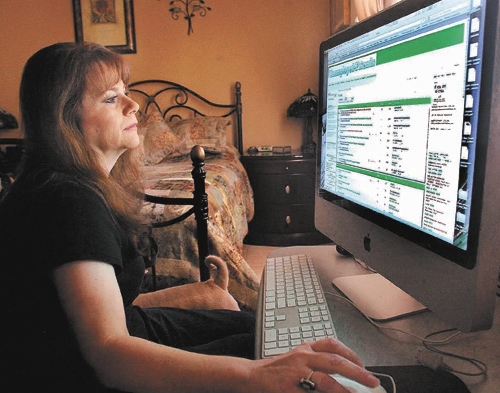Unemployed no longer eligible for benefits struggle to find work, pay bills
Bud Meyers sits at a bar in the Palms, taking turns nursing a Heineken and drawing deeply on an ever-present cigarette pinched between his fingers.
He watches the bartender with an expert eye, silently critiquing his performance. A piece of trash litters the floor; an ashtray fills with discarded ashes and cigarette butts.
That would never happen if Meyers were behind the bar, he says.
He sounds proud, but also resigned. Meyers fears he may never get the chance to prove his statement. For 17 years, the 55-year-old native of Philadelphia worked as a bartender in casinos, until he was laid off from his job at the Riviera in 2008. He wants nothing more than to be a bartender again. Or a bar back. Or even a bar porter or anything that pays a wage.
Although he has searched diligently, Meyers has yet to find another job. After filling out hundreds of applications -- he has lost count -- and visiting potential employers in person, he has landed only one interview. He is still on the Bartenders Local 165 call back list, but there isn't enough work to go around, he says. When he arrived at the bar to talk to a reporter about his life on unemployment, he first chatted up a manager, gave him his card and asked for a job.
"I talk to everybody," he says.
Meyers is one of 6.1 million of the nation's long-term unemployed, workers who have been without work for more than six months, according to Bureau of Labor Statistics. He also is a "99er," that group of unemployed people who have exhausted all of their benefits. The government calls them exhaustees, but the term 99er -- referring to the total number of weeks a person could potentially draw unemployment benefits -- has caught on among the very group it describes.
At first, Meyers is reluctant to share his story, fearful that people might not want to read about the stress, depression and anxiety that comes with being out of work for so long.
"I didn't want my mom, my former co-workers or potential employers to see me beaten down," he explains. Meyers is a proud man raised with the belief that hard workers are rewarded. Now that his persistence isn't paying off, he has become disillusioned, ashamed. "It's embarrassing. I always thought of myself as a winner."
He finally decides telling his story may help others like him. And he hopes it will bring attention to 99ers, how they are falling through the cracks and how desperately they are in need of some help. Any help.
During the past two years, Congress has passed extensions that could provide as many as 99 weeks of unemployment benefits for some. But it is not that simple. The number of weeks people can draw benefits depends on when they lost their jobs and where they live.
Unemployment compensation lasts 26 weeks in Nevada; once state benefits are exhausted, the federal extended benefits kick in. They are divided by tiers, one through four, each tier lasting for several weeks. Once people exhaust tier four benefits, there is no tier five to continue. They become a "99er" even if they didn't receive 99 weeks of compensation.
Many people mistakenly believe, Meyers says, that all unemployed people receive benefits with every congressional extension.
In an effort to correct such misconceptions and to sharpen his computer skills, Meyers started a website, acompanyofone.org, advocating for a tier five and providing facts about the economy, Bureau of Labor statistics, Wall Street, businesses, the Great Depression and other topics.
Several local 99ers were reluctant to talk about their experiences, worried that the online world of anonymous comments would unfairly tear them apart. They all told similar stories of increasing desperation and hopelessness, despite their strong work histories, education and skills.
They gather in cyberspace to share stories, offer advice and lift flagging spirits through websites such as unemployed-friends.com. Some write about the devastating effects unemployment has had on their psyches and self-esteem.
"It has an effect on a person," Meyers explains. "I can remember two years ago, I was on top of the world."
He did simple things he once took for granted: stopping at the store on his way to work to buy a Slim Jim and a newspaper. Having a drink with friends after work. Dropping change into the cup of a man begging on a sidewalk. Now, he says, he can't spare the money to buy new socks or underwear or even get his teeth fixed. One tank of gas has lasted him nearly a year, Meyers says, because he drives only for job searches and grocery shopping.
Mental health experts say unemployment is among the most stressful events that can happen in someone's life. Researchers also have found that losing unemployment benefits can increase a person's chance of suicide.
Meyers doesn't talk about suicide but admits he is very depressed. He is vested in the bartenders' union and has a pension coming to him, but he can't draw it until he turns 62, in seven years. His savings will run out in December. Until then, Meyers says he will redouble his efforts and make one more push to find a job.
When asked what will happen if he doesn't, he says, "I won't be homeless, let's just leave it at that."
Jeanne Guajardo , 56, is worried about her friend Meyers. They met online four months ago on an unemployment discussion board. Guajardo had just been laid off from her full-time job as a cashier at a local magic shop, where she worked for 14 years.
Meyers gave her hope, she says.
"I hadn't really come across too many Las Vegans on the unemployment sites," she says. "I thought we could put our heads together and go from there."
Guajardo's benefits will run out in December, and she will be a 99er unless Congress again extends them. Hundreds of applications have netted her two in-person interviews. At the first, a candy shop, they told her she was overqualified.
"I got the impression that, what they meant by 'overqualified,' is that I was too old for the job," Guajardo says.
The second interview was with a dog groomer. It went well, she says, but the owner never called back. In the meantime, Guajardo has sold her belongings just for the extra cash, even parting with a piano that she considered a family heirloom.
Searching for so long with nothing to show for it is discouraging, Guajardo says, so she can relate to how Meyers is feeling.
"You get depressed. He said he's basically given up," she says. "I understand it. I totally do."
The way people perceive the unemployed doesn't help, Meyers says. People tend to look down on them, blaming them for their job loss and their inability to find a new one, he adds. And the media sometimes fuel that attitude.
"They depict 99ers as people sitting around the pool for two years drinking margaritas. In reality, we would rather be working," says Meyers, who is drinking his first beer in nearly two years.
He knows someone will criticize him for indulging but, with the money running out in a matter of weeks, $7 won't make much of a difference, he says.
John Garofalo, 39, is not a 99er, yet. But he could be by November, if Congress doesn't approve a tier five. A former technical writer for a local slot manufacturing company, Garofalo has been out of work since April, 2009. His sense of urgency is growing, but he doesn't know what more he can do to get a job. Every day is the same: look for jobs -- any job -- send out resumes, make phone calls, make in-person visits when he can.
The past months have taken a toll on Garofalo; he has lost 60 pounds. He lives alone but has a strong social support system, he says. He is making contingency plans for every scenario.
A problem many of the long-term unemployed cite is the lack of a place to turn for help or guidance. Single people without children do not qualify for food stamps, welfare or other assistance. And training programs do little good when jobs are so scarce.
"I felt desperate and hopeless," says Sharon Lewis, 48.
She was laid off from her job in Minnesota in early 2008. Her brother's boss was looking for an administrative assistant, she says, so she applied and moved to Las Vegas. By the time she arrived, the company had laid off its employees.
During the past two years, Lewis found spotty work, first at a temporary agency. The company laid people off and her assignment ended. Earlier this year, she landed a job as a customer service representative; a couple of weeks later, the company closed.
"I was really getting frustrated. At this point, I was thinking I was going to end up in a shelter," she says.
Growing up Catholic, Lewis was familiar with the work of Catholic Charities and thought they might be able to help. In March, she signed up for the Adult and Dislocated Worker program, which provides a variety of employment services and training opportunities to employable Nevada residents. About a month ago, while enrolled in classes to earn her bookkeeping certification, she heard about a project leader position for Graphic Imaging Services, a small local business.
She came within days of being evicted from her apartment. Things are looking much better for her now, Lewis says, but a few weeks on the job can't erase the damage done by years of unemployment. The thought that she could lose this job always is in the back of her mind, she says. She is still behind on her bills. And the feeling of having to ask others for help during her most vulnerable time stays with her. Putting aside her pride and reaching out to others was hard, she says.
While she understands people getting to the point where they consider death an option, Lewis says she thinks there's always hope. And she uses herself as an example. Just at the moment when she was planning on becoming homeless within days, she got a job interview.
"Just keep the faith," she says. "It may get to the bitter end where you think there is no hope and then something happens. It happened to me. It can happen to anyone."
Contact reporter Sonya Padgett at spadgett@reviewjournal.com or 702-380-4564.




























